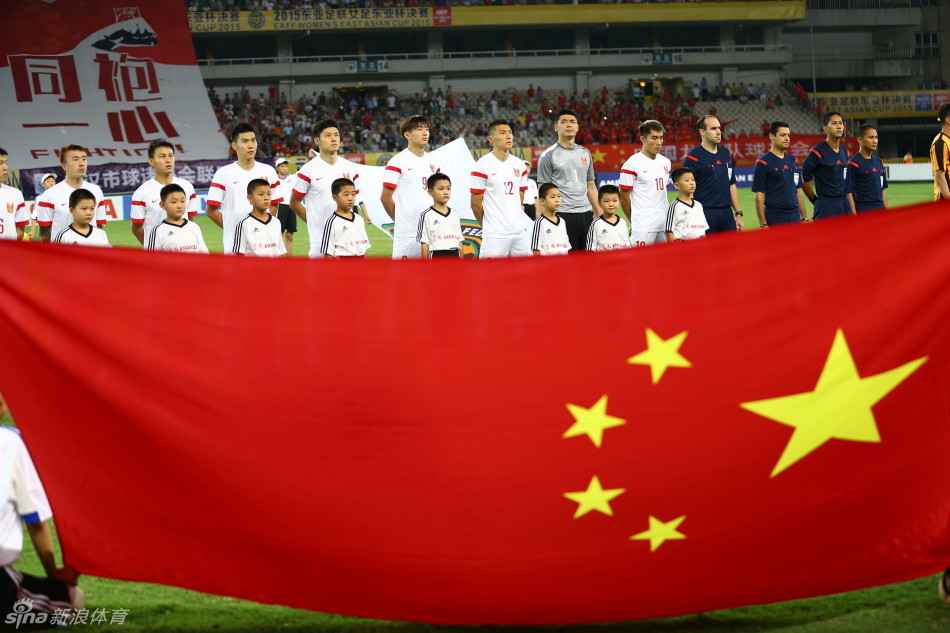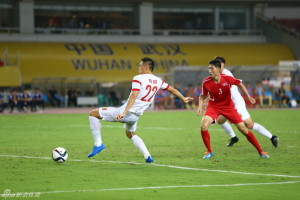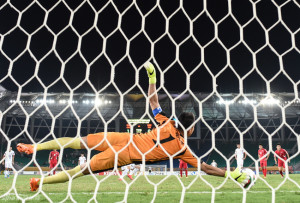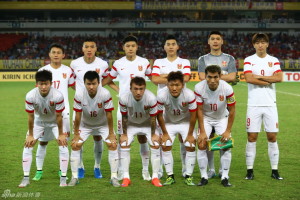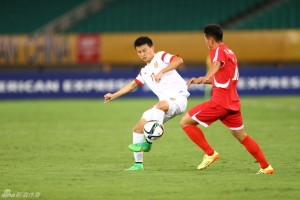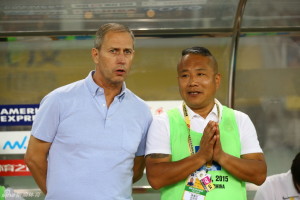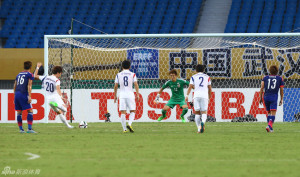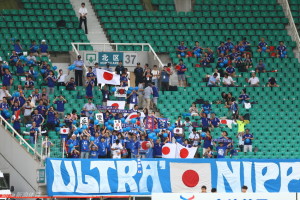A goal from Yu Dabao and a soft penalty, converted by Wang Yongpo, were enough to give a much changed China team victory over North Korea in the East Asian Cup. Yu struck from close range in the 36th minute before giving Wang the chance to double the lead by winning a spot kick six minutes after the break.
East Asian Cup
China 2
Yu Dabao 36′
Wang Yongpo (pen) 51′
North Korea 0
Following Sunday’s comprehensive 2-0 defeat at the hands of South Korea, Alain Perrin made nine changes to his starting line-up and it seemed to help as China put in a much improved, if not entirely convincing, performance. Making the surprising decision to switch to a five man defence, the Frenchman placed Zheng Zhi in the middle of an otherwise inexperienced quintet, and it paid off as the centre back trio of Zheng, Lei Tenglong and Yu Yang were able to hold off the two man North Korean strike force which had given Japan so much trouble three days earlier.
China did look nervous early on with central midfield duo of Liu Jianye and Wang Yongpo guilty of mislaying simple passes and the North Koreans being offered a few opportunities to shoot from distance. The closest of those came when midfielder Ri Chol-myong forced Zeng Cheng into an acrobatic save in the 15th minute.
As the nerves settled, though, China started to ease their way into the game with Yu Dabao looking threatening down the left and centre forward Yang Xu doing a lot more with the ball than Gao Lin had in the previous game. A perfectly weighted through ball from Yang gave Yu a shooting opportunity in the 24th minute, but the Beijing Guo’an man’s effort was too close to North Korean goalkeeper Ri Myong-guk. Three minutes later, Sun Ke played in a nice cross from the right but Yang was not able to generate enough power in his header to beat Ri.
The North Koreans continued to play their part, both winning and wasting a slew of set pieces in dangerous areas, but China were able to make the decisive breakthrough around ten minutes before the interval. Left back Rao Weihui, making his first international start, under hit a long ball into Sun Ke which Kang Kuk-chol failed to deal with. This gave the Jiangsu Sainty winger the chance to hook a pass across to Yu Dabao, who controlled it well on his chest before poking home.
The goal brought relief to the reported 23,000 in attendance (more likely 15-20,000), but the North Koreans didn’t lie down and went immediately back on the attack. The Chinese defence was generally able to deal with their opponents’ direct style, but were almost caught out on the stroke of half time when Ri Hyok-chol’s cross found an unmarked Ro Hak-su ghosting in at the back post. Fortunately, the Rimyongsu winger lacked composure in his finish and he fired wide.
Liu Binbin was introduced at half-time in place of Sun Ke, but China continued look nervous with simple passes, particularly those of Liu Jianye, going astray. But things really turned in the 50th minute when Ri Yong-chol was adjudged to have upended Yu Dabao as he surged into the penalty area to receive a return pass. The contact was minimal and Yu went down very easily but, after a moment’s hesitation, Malaysian referee Mohd Amirul Izwan pointed to the spot.
After surprisingly unenthusiastic protests from the North Koreans, Wang Yongpo stepped up to score his fourth penalty in just ten international appearances and all but seal the result. The North Koreans continued to push forwards, but had few clear cut opportunities.
Just after an hour, Zeng Cheng had to be quick off of his in line in order to clear a dangerous through ball from Ri Hyok-chol before Ro Hak-su could get a decisive touch. Manager Kim Chang-bok then made a final roll of the dice by sending on lofty forward Pak Hyon-il in the 64th minute.
The 21-year-old turned the game when he came on at a similar time against Japan last weekend when he used his head to provide a goal and an assist in their 2-1 comeback victory. It was clear that Kim was hoping for more of the same here, as his side began lofting high balls into Pak at every opportunity.
But with three centre backs instead of two, China did a much better job of handling Pak than the Japanese did and the youngster grew frustrated as the Chinese defence used physical means, both legal and otherwise, to unsettle him. By this point, China were happy to sit back and let North Korea loft balls into the area, while using Liu Binbin’s pace to threaten on the counter.
North Korea had a procession of late corners and did go close with a couple of off target headers, neither of which was from Pak, but it ultimately came to nothing. The win, coupled with South Korea’s earlier 1-1 draw with Japan, means that China can still lift the East Asian Cup should they be victorious over the Japanese on Sunday and South Korea fail to beat their old ideological rivals from the North.
Ringing in the Changes
After seeing a team of his favourites easily dispatched at the hands of South Korea, Alain Perrin opted to make wholesale changes to his team for the East Asian Cup’s second game. The nine changes in personnel were obviously significant but the biggest alteration was the shift to a back five.
At first glance, adding a defender looked like a strange decision given this squad’s lack of depth at the position and the relatively inferiority of North Korea. When one considers that Perrin apparently distrusted those inexperienced defenders available to him so much that he opted to play midfielder Zheng Zhi in the middle of a back four in the first game, the decision seems even more bizarre.
However, the line-up made sense for a number of reasons, not least because the North Koreans 4-4-2 formation, an increasing rarity in international football, posed Japan’s back four such problems in the opener. With the North Koreans mostly using direct football, reliant on long balls and crosses, a five man midfield isn’t really necessary and three centre backs should mean you always have a man advantage in dangerous areas.
The extra man also gave the inexperienced Yu Yang and debutante Lei Tenglong more security. Importantly, Zheng Zhi was given more freedom to play the ball out of defence and the full backs were able to push up in attack.
Against South Korea, full backs Ren Hang and Ji Xiang didn’t get forward at all, but left-back Rao Weihui and Wang Tong, winning his first international cap on the right, had plenty of license to push on here, meaning China were more like a 3-4-3 when in attack. Neither Yu Yang, who looked vulnerable in the air, nor Lei Tenglong, who was particularly nervous on the ball in front of his hometown crowd, had career changing performances, but they stood firm and mostly dealt with the barrage of crossed and long balls sent their way.
Olympic team player Wang Tong and Rao Weihui both did fine too, although Rao was guilty of letting right winger Ro Hak-su sneak in behind him to connect with a cross just before half-time. It’s also worth noting that hometown hero Zeng Cheng, replacing Wang Dalei in goal, made a fine save in the first half and was a commanding presence in the penalty area, even if his kicking was dreadful at times.
In the middle, Wang Yongpo overcame an uninspiring performance against South Korea to be the only player apart from Zheng Zhi to keep his place in the team. After a nervy start, featuring a few misplaced passes, he recovered well and was rewarded for his improved display with a goal from the penalty spot.
Surprisingly, it was Liu Jianye who accompanied Wang in the middle, with the Jiangsu Sainty man completing his first 90 minutes for the national team since 2013. While far from terrible, Liu was guilty of several sloppy passes and it is still hard to imagine him holding his own against better quality midfields at international level.
Yu Dabao put in a strong performance on the left-wing where he scored a well taken goal and, with an enthusiastic tumble, earned China’s penalty. The strike was Yu’s fifth in five games for the national team, and it remains to be seen how long Perrin can resist making him a regular in his starting eleven.
Sun Ke started on the right and, although he did provide the assist for Yu’s goal and a good cross for Yang Xu, he didn’t look as directly threatening as he did when coming off the bench against South Korea. Liu Binbin replaced him at the interval and the 22-year-old did a good job of keeping the North Korean defence honest late in the game.
Having recently struggled with his fitness, Yang Xu was given the nod up front and, in the first half, he demonstrated his ability to hold up the play and bring the wingers into the attack. A neat through ball to Yu Dabao was followed up by weak header on goal and he made less of an impact in the second half once China started sitting on their 2-0 lead.
After the game, Perrin suggested that the primary reason for all the changes was fatigue and minor injuries rather than a response to the performance against South Korea. With the likes of Wu Lei, Wang Dalei, Gao Lin, Feng Xiaoting, Wu Xi and Ren Hang all missing from this starting line-up, Sunday’s game against Japan may give us a better idea of which players have done long term harm or good to their international prospects over the last two games.
What’s next?
The final round of the East Asian Cup kicks off on Sunday and China are still in with a shot of winning the trophy should North Korea get a result against their Southern foes. The bad news is that they will have to beat the highest ranking team in the tournament, Japan. The good news is that they will also have to beat the worst team in the tournament so far, Japan.
Japan manager Vahil Halilhodzic brought a very inexperienced team with him to Wuhan and they have underwhelmed thus far. Yuki Muto put them one up inside three minutes of their opener against North Korea, but a combination of poor finishing and a more energetic opponent saw them fall 2-1.
Yesterday, a fine long range strike from Hotaru Yamaguchi gave them an undeserved 1-1 draw with South Korea after Guangzhou R&F’s Jang Hyun-soo had given the Taegeuk Warriors the lead with a penalty. Both of those goals came in the first half and the South Koreans had much the better of a dull second half without being able to find their cutting edge.
However, South Korea’s German boss Uli Stielike had made eight changes from the team that dispatched China with only Jang and Guangzhou Evergrande centre back Kim Young-gwon keeping their places among the outfielders. Importantly, their entire front four was different and the new quartet lacked the quick passing that had torn apart the home team just three days ago.
The point is, that Japan’s draw with South Korea shouldn’t be taken either as a sign of their improvement, or of this squad having any notable superiority over their Chinese counterparts. The Japanese, who were still playing J-League games until just last Wednesday, made five changes of their own before the South Korea game, but it did little to improve the performance of a team who really struggles in front of goal.
Alain Perrin has already acknowledged that scoring is Japan’s weakest area and that is encapsulated by hard working right winger Nagai Kensuke who catches the eye when using his pace to run at defenders, but has absolutely no end product to show for it. With Japan looking to fashion opportunities by passing the ball through their five man midfield, we can expect China to switch to a back four and probably fall behind in the possession statistics.
What we are unlikely to see, though, is a tired looking Japanese side relentlessly pressing while China are in possession like South Korea did, and that means the Chinese should be able to do more with the ball when they have it. The Japanese have a solid centre back pairing in Makino Tomoaki and Morishige Masato, but they showed serious vulnerabilities in the air against North Korea and Perrin may seek to use high balls into Yang Xu to exploit that.
China haven’t beaten Japan since 1998 and they have an excellent chance to do so here. Of course, this is little more than a Japanese B’ side but, even if the long term consequences are minimal, it would give a good short term boost and will help Chinese football recover some pride after the humbling by South Korea. If South Korea beat the North in the first game on Sunday, there will be nothing tangible at stake here, but it would still be nice to see China get a victory over the Samurai Blue, regardless of who’s wearing the colour.
